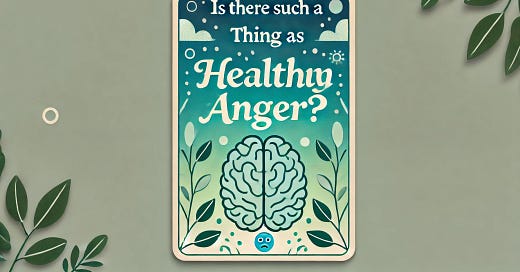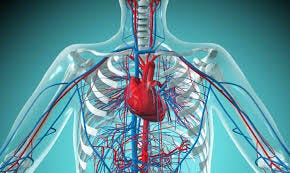Is There Such a Thing as Healthy Anger? 🧠
How to Use Anger Constructively and Heal from Emotional Trauma (8min Read)
TL;DR Summary:
Distinguish Healthy vs. Unhealthy Anger: Learn how healthy anger protects boundaries while unhealthy anger stems from unrealistic expectations.
Impact on Relationships: See how healthy communication fosters understanding, while silent resentment corrodes trust.
Immediate vs. Long-term Anger: Discover how immediate anger addresses specific incidents, while long-term entitlement breeds persistent dissatisfaction.
Effect on Nervous System: Understand how anger triggers short-term fight-or-flight responses and how chronic anger impacts mental and physical health.
Transform Your Anger: Explore strategies to shift from unhealthy to healthy anger, promoting personal growth and well-being.
Healthy Anger vs. Unhealthy Anger
Anger is an emotion we all experience, yet it remains one of the most misunderstood and stigmatized feelings.
For survivors of abusive relationships, navigating anger can be particularly challenging.
The trauma from such relationships often leaves people grappling with intense emotions, including anger, which can manifest in both healthy and unhealthy ways.
Understanding the distinction between these forms of anger and learning to manage them is crucial for healing and personal growth.
This is why today, I’d like to talk about the distinctions between healthy and unhealthy anger, explore how anger affects the nervous system, and of course, offer strategies to shift from unhealthy to healthy anger.
Let’s dive in!
Understanding Healthy vs. Unhealthy Anger
Healthy anger acts as a protective response, signaling when our personal boundaries are being violated.
It's a natural and necessary reaction that can drive us to take action, protect ourselves, and assert our needs.
For instance, if someone disrespects your boundaries repeatedly, feeling anger is a sign that your mind and body are alerting you to take a stand.
Unhealthy anger, on the other hand, often arises from thwarted expectations and a sense of entitlement.
This form of anger can become chronic and destructive, leading to negative outcomes in our relationships and mental health.
An example of unhealthy anger might be feeling rage when a minor expectation is not met, such as someone not replying to a text message promptly.
This kind of anger can spiral into feelings of resentment and bitterness, impacting your overall well-being.
Comparing Healthy vs. Unhealthy Anger
Here are 3 specific examples of situations where the difference between healthy anger and unhealthy anger is pretty clear!
1: Boundary Violation vs. Thwarted Expectations
Healthy Anger & Boundaries
Picture your personal boundaries as the walls of a fortress, guarding your well-being and peace of mind.
When someone repeatedly disrespects these boundaries, it’s as if they’re battering at your gates.
Feeling anger in this situation is a natural and necessary response, signaling that your defenses need to be strengthened.
For example, imagine a coworker constantly interrupting you during meetings, disregarding your need for uninterrupted time to present your ideas.
Expressing your frustration to this coworker and setting clear boundaries is like raising the drawbridge, protecting your territory, and restoring respect and effective communication within your workplace.
Unhealthy Anger & Expectations
Now, envision a scenario where you expect your partner to always agree with your opinions.
This expectation is like building a fragile tower on the shifting sands of validation.
When your partner voices a different perspective, it feels like a storm battering this tower, causing you to experience an intense, disproportionate rage.
This kind of anger is rooted in an unrealistic expectation of always being right, leading to conflict and resentment, much like the inevitable collapse of the unstable tower.
2: Constructive Communication vs. Silent Resentment
Healthy Anger & Communication
Healthy anger acts as a constructive force, much like a well-built bridge connecting two islands.
It involves assertively communicating your feelings to others, ensuring that misunderstandings are addressed and resolved.
For instance, telling a friend, "I feel upset when you cancel plans last minute because it disrupts my schedule," is akin to placing sturdy planks on the bridge, allowing you to cross over to mutual understanding and work towards a solution together.
Unhealthy Anger & Resentment
In contrast, unhealthy anger is like a toxic substance seeping into the foundation of your relationships.
Instead of communicating your feelings, you might hold onto your anger silently, allowing it to fester into resentment.
Over time, this toxic buildup can corrode the trust and intimacy in your relationships, leading to passive-aggressive behavior and unresolved conflicts.
Silent resentment is like a hidden crack in the foundation, which, left unchecked, can cause the entire structure to crumble.
3: Immediate Reaction vs. Long-term Entitlement
Healthy Anger & Threat Response
Healthy anger often arises in response to immediate, specific incidents, much like a well-tuned alarm system that alerts you to a present danger.
For example, if someone cuts in front of you in line, your anger prompts you to assert your place and maintain fairness.
This immediate reaction is akin to addressing the alarm, ensuring that the situation is rectified promptly and effectively.
Unhealthy Anger & Entitlement
Unhealthy anger, on the other hand, frequently stems from a long-term sense of entitlement, much like a simmering pot that’s been left unattended on the stove.
You might feel persistent anger because you believe you deserve certain privileges or recognition that you’re not receiving.
This ongoing entitlement creates a perpetual state of dissatisfaction and bitterness, much like the pot eventually boiling over, causing a mess that’s difficult to clean up.
The Impact of Anger on the Nervous System
Alright, so you’re getting the difference by now, but what about the nervous system?!
Anger, like any strong emotion, has significant effects on the nervous system.
These effects can vary greatly depending on whether the anger is short-term and healthy or chronic and unhealthy.
Short-term Effects of Anger
In the short term, anger triggers the fight-or-flight response in the body.
The amygdala, the brain's threat detection center, signals the hypothalamus to activate the sympathetic nervous system.
This leads to the release of stress hormones such as adrenaline and cortisol. These hormones prepare the body to respond to the perceived threat by:
Increasing heart rate
Raising blood pressure
Tensing muscles
Heightening alertness on the source of anger
While these responses are essential for immediate, short-term reactions, they can be harmful if experienced too frequently or for prolonged periods.
Chronic Unhealthy Anger
When anger becomes chronic and unhealthy, the continuous activation of the fight-or-flight response can have detrimental effects on the mind, brain, and body.
Here’s how chronic unhealthy anger impacts each:
Mind:
Mental Health Issues: Chronic anger is linked to increased anxiety, depression, and stress. It can lead to feelings of helplessness and frustration, perpetuating a cycle of negative emotions.
Impaired Relationships: Persistent anger can erode trust and intimacy in relationships, leading to social isolation and loneliness.
Brain:
Neurotransmitter Imbalance: Long-term anger can disrupt the balance of neurotransmitters such as serotonin and dopamine, which are crucial for mood regulation.
Reduced Cognitive Function: Chronic stress and anger can impair memory, concentration, and decision-making abilities. The prefrontal cortex, responsible for rational thinking and impulse control, can become less effective.
Body:
Cardiovascular Problems: Chronic anger is associated with an increased risk of hypertension, heart attacks, and strokes due to sustained high blood pressure and elevated heart rate.
Immune System Suppression: Prolonged stress and anger can weaken the immune system, making the body more susceptible to infections and illnesses.
Gastrointestinal Issues: Chronic anger can contribute to digestive problems such as ulcers, irritable bowel syndrome (IBS), and other gastrointestinal disorders.
Musculoskeletal Problems: Constant muscle tension from chronic anger can lead to headaches, back pain, and other musculoskeletal issues.
Shifting from Unhealthy Anger to Healthy Anger
Understanding and managing anger involves shifting focus from unhealthy patterns to healthier responses.
Here are strategies to help you make this transition:
Name Your Anger: Naming this Part of you is the first step in getting to know it better!
Recognize Your Triggers: Identify situations that trigger your unhealthy anger. Reflect on past incidents and note common themes. Understanding these triggers helps you anticipate and prepare for potential anger-inducing scenarios.
Adjust Expectations: Examine your expectations and assess their realism. Are they based on entitlement or reasonable standards? Shifting your focus from expecting specific outcomes to controlling your actions can reduce frustration and promote healthier responses.
Practice Controlled Breathing: When you feel anger rising, practice deep, controlled breathing. This technique calms your nervous system, allowing you to respond thoughtfully rather than react impulsively.
Take Breaks: During heated moments, step away to regain composure. Taking a break gives your brain time to process emotions and engage the prefrontal cortex, helping you respond more rationally.
Communicate Assertively: Express your feelings directly and assertively. Use "I" statements to convey your emotions without blaming others. For example, "I feel upset when..." rather than "You always...".
Focus on Internal Fulfillment: Shift your focus from seeking external validation to finding internal fulfillment. Recognize that your worth is not determined by others’ recognition but by your own values and accomplishments.
Through these practices, you can transform your anger from a destructive force into a powerful ally for personal growth and well-being.
By mastering the art of healthy anger, you protect your boundaries, communicate effectively, and respond constructively to life’s challenges, ultimately leading to a more fulfilling and balanced life.
This is easier said than done, and I always suggest the help of a good IFS coach or therapist, but this list can at least get you started!
Health Anger to the Rescue
Anger, when understood and managed properly, can be a powerful ally in the healing process.
Learning to differentiate between healthy and unhealthy anger and implementing effective management techniques is crucial for reclaiming control over our emotions and lives!
Understanding and managing anger not only improves relationships but also frees up mental space for focusing on personal growth and happiness.
I hope this blog helps you take a closer look at what part anger has in your life!
Until next time… Live Heroically 🧠
Supporting Research
Averill, J. R. (1982). Anger and Aggression: An Essay on Emotion. New York: Springer-Verlag.
Berkowitz, L., & Harmon-Jones, E. (2004). Toward an understanding of the determinants of anger. Emotion, 4(2), 107-130. https://doi.org/10.1037/1528-3542.4.2.107
Feindler, E. L., & Starr, K. E. (2003). Anger management. In E. J. Mash & R. A. Barkley (Eds.), Treatment of Childhood Disorders (pp. 243-272). New York: Guilford Press.
Kassinove, H., & Tafrate, R. C. (2002). Anger Management: The Complete Treatment Guidebook for Practitioners. Atascadero, CA: Impact Publishers.
Spielberger, C. D. (1999). State-Trait Anger Expression Inventory-2 (STAXI-2). Lutz, FL: Psychological Assessment Resources.
Tavris, C. (1989). Anger: The Misunderstood Emotion. New York: Simon & Schuster.
Thomas, S. P. (2001). Teaching healthy anger management. Journal of Nursing Education, 40(5), 231-238.
Williams, R. B., & Williams, V. P. (1993). Anger Kills: Seventeen Strategies for Controlling the Hostility That Can Harm Your Health. New York: HarperCollins.
Wilkowski, B. M., & Robinson, M. D. (2008). The cognitive basis of trait anger and reactive aggression: An integrative analysis. Personality and Social Psychology Review, 12(1), 3-21. https://doi.org/10.1177/1088868307309874

















Again, many thank. Makes huge sense